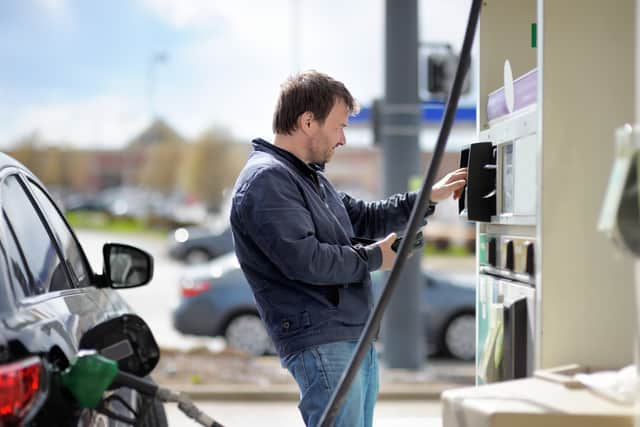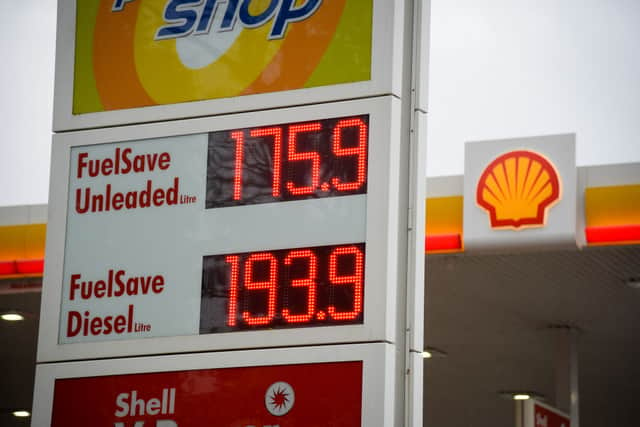Petrol and diesel prices hit new record highs as fuel duty cut cancelled out
and live on Freeview channel 276
The cost of petrol and diesel has hit new record highs, just a day after retailers were accused of exploiting drivers to extend their profits.
New figures show that the average price of a litre of petrol has now reached 167.3p while diesel has reached 180.9p.
Advertisement
Hide AdAdvertisement
Hide AdThat means both fuels are now more expensive than in mid-March before a 5p per litre cut in the fuel duty rate.
Figures from both the RAC and data specialists Experian Catalist show that the cost of filling an average family car with petrol is now £92.20 while diesel drivers will pay £99.50.


The new figures come a day after the RAC revealed retailers had extended their profit margins by 2p per litre since the fuel duty cut and as the Business Secretary wrote to the industry to urge businesses to treat drivers fairly.
The RAC’s fuel spokesman Simon Williams said the latest rises would contribute to the worsening cost of living crisis and were all the more notable as they meant prices were now higher than before the fuel duty cut that was supposed to ease pressure on motorists.
Advertisement
Hide AdAdvertisement
Hide AdHe said: “While the average price of both petrol and diesel would have been far higher without the historic duty cut, it’s also unfortunately the case that drivers haven’t seen the full benefit at the pumps due to major retailers upping their margins.”
The previous record high for petrol was 167.3p and was recorded on the 22 March, the day before the fuel duty cut. Diesel prices exceeded their previous record on Monday, hitting 180.3p before rising to 180.9p on Tuesday.


RAC data shows that since 23 March, fuel retailers have extended their profit margins from 9p per litre on petrol and 6p on diesel to 11p and 8p respectively.
AA fuel price spokesman Luke Bosdet criticised retailers for failing to pass on the savings from the fuel duty cut. He said: “Despite his best efforts, the Chancellor must feel like King Canute having tried to reverse the tide of rising pump prices.
Advertisement
Hide AdAdvertisement
Hide Ad“At least though, he can say that UK drivers would be £2.75-a-tank even more worse off now had he not tried to take action in March.
“He hasn’t been helped by a fuel trade that, despite a 16p-a-litre fall in petrol costs that coincided with the spring statement, couldn’t even pass on the full 5p fuel duty cut and the 1p VAT reduction that it brought with it.”
On Tuesday, Business Secretary Kwasi Kwarteng wrote to fuel retailers to “remind them of their responsibility” towards customers and questioning why the fuel duty cut did not appear to have been passed on in “any visible or meaningful way”.
He wrote: “The Chancellor and I therefore want to re-emphasise and communicate again our expectation that members do everything possible to ensure that drivers are getting a fair deal across the country.”
Advertisement
Hide AdAdvertisement
Hide AdHe also warned that his department had spoken to the Competition and Markets Authority over “perceived intransigence” around pricing and that the regulator was “closely monitoring” the situation.
The Petrol Retailers Association, which represents independent filling stations blamed rising oil prices, lower demand and “additional expenses” for apparent disparity between prices and profit margins.
Its executive director, Gordon Balmer said comparing pump prices with wholesale prices “only gives a partial picture” and retailers were competing on the “thinnest of margins”.
Comment Guidelines
National World encourages reader discussion on our stories. User feedback, insights and back-and-forth exchanges add a rich layer of context to reporting. Please review our Community Guidelines before commenting.
